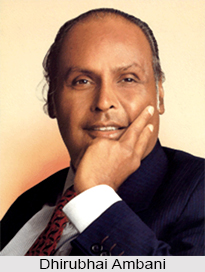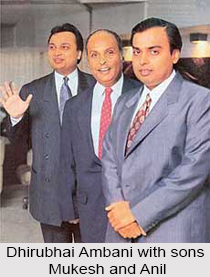 Dhirajlal Hirachand Ambani, loving called Dhirubhai, was an Indian business tycoon who founded Reliance Industries, India"s largest private conglomerate in the year 1962 in Bombay, with his cousin. His success in the petrochemicals industry is a story from rags to riches that made him a cult figure in the minds of the Indian people. Dhirubhai Ambani took his company Reliance public in 1977 and by 2007, the combined fortune of the family was 60 Billion USD. One of the most enterprising Indian entrepreneurs, Dhirubhai Ambani built India`s largest private sector company and created an equity cult in the Indian capital market. Reliance is the first Indian company to feature in the Forbes 500 list. Dhirubhai Ambani died on July 6, 2002 and has most recently in 2016 been posthumously conferred the Padma Vibhushan, India"s second highest civilian honour by the Government of India, for his contributions in the domain of Trade and Industry.
Dhirajlal Hirachand Ambani, loving called Dhirubhai, was an Indian business tycoon who founded Reliance Industries, India"s largest private conglomerate in the year 1962 in Bombay, with his cousin. His success in the petrochemicals industry is a story from rags to riches that made him a cult figure in the minds of the Indian people. Dhirubhai Ambani took his company Reliance public in 1977 and by 2007, the combined fortune of the family was 60 Billion USD. One of the most enterprising Indian entrepreneurs, Dhirubhai Ambani built India`s largest private sector company and created an equity cult in the Indian capital market. Reliance is the first Indian company to feature in the Forbes 500 list. Dhirubhai Ambani died on July 6, 2002 and has most recently in 2016 been posthumously conferred the Padma Vibhushan, India"s second highest civilian honour by the Government of India, for his contributions in the domain of Trade and Industry.
Early Life and Career of Dhirubhai Ambani
Dhirubhai Ambani was born on December 28, 1932 at Chorwad, in the Junagadh district of the western Indian state of Gujarat, as the second son to Hirachand Gordhanbhai Ambani, a school teacher and Jamnaben, in a Modh family of very moderate means. Dhirubhai was precocious and highly intelligent. At 17, he moved to Aden, Yemen. Initially, Dhirubhai worked as a dispatch clerk with A. Besse & Co. at a salary of Rs. 300. After becoming the distributor for Shell products, A. Besse & Co. promoted Dhirubhai to manage the company`s oil filling station at the port of Aden.
Establishment of Reliance by Dhirubhai Ambani
In the year 1962, Dhirubhai Ambani returned to Bombay and started Reliance Commercial Corporation, a commodity trading and export house with an initial capital of Rs. 15000, in partnership with Champaklal Damani, his second cousin who lived with him in Aden. The primary business was to import polyester yarn and export spices. The first office of the Reliance Commercial Corporation was set up at the Narsinathan Street in Masjid Bunder. It was a 350 square feet room with a telephone, one table and three chairs. Initially, they had two assistants to help them with their business. In 1965, Champaklal Damani and Dhirubhai Ambani ended their partnership and Dhirubhai started on his own. It is believed that both had different temperaments and a different take on how to conduct business. While Mr. Damani was a cautious trader and did not believe in building yarn inventories, Dhirubhai was a known risk taker and he considered that building inventories, anticipating a price rise, and making profits through that was good for growth. During this period, Dhirubhai and his family used to stay in a one bedroom apartment at the Jaihind Estate in Bhuleshwar, Mumbai. In 1968, he moved to an upmarket apartment at Altamount Road in South Mumbai. Ambani`s net worth was estimated at about Rs. 1 million by late 1960s.
Dhirubhai started his first textile mill at Naroda, near Ahmedabad in 1966 with the brand "Vimal", naming it after his elder brother Ramaniklal Ambani`s son, Vimal Ambani. Textiles were manufactured using polyester fibre yarn. Extensive marketing of the brand "Vimal" made it a household name in the interiors of India. In 1975, a technical team from the World Bank certified that the Reliance textile plant was "excellent by developed country standards." In the year 1977, Reliance was taken public and with the passage of time, Dhirubhai diversified the company into petrochemicals and sectors like telecommunications, information technology, energy, power, retail, textiles, infrastructure services, capital markets and logistics.
Equity Cult by Dhirubhai Ambani
The `equity cult` in India is the brainchild of Dhirubhai Ambani. He has been credited in shaping the Indian equity culture. More than 58,000 investors from various parts of India subscribed to Reliance`s IPO (Initial Public Offering) in 1977. People of rural Gujarat had been convinced by Dhirubhai that being shareholders of his company will only bring returns to their investment. Reliance Industries was the only Public Limited Company whose several Annual General Meetings were held in stadiums because of the number of shareholders. Dhirubhai revolutionized capital markets. From nothing, he generated billions of rupees in wealth for those who put their trust in his companies. With innovative instruments like the convertible debentures, Reliance quickly became a favourite in the stock market in the 1980s.
Assisted by his two sons, Mukesh and Anil, Dhirubhai Ambani turned Reliance Industries Limited into India`s largest private sector company. The British Broadcasting Corporation described the company as a whole as "a business empire with an estimated annual turnover of dollar 12 billion, and an 85,000-strong workforce." Today, the Reliance Group has one of the largest families of shareholders in the world. An investment of over Rs. 36,000 Crores (USD 9 billion) in petroleum refining, petrochemicals, power generation, telecommunication services and a port terminal in a 3-year time frame, has steered the Reliance Group to its current status as India`s leading textiles-petroleum-petrochemicals-power-telecom player.
Personal Life of Dhirubhai Ambani
Dhirubhai Ambani was married to Kokilaben and had two sons, Mukesh Ambani and Anil Ambani and two daughters, Nina Kothari and Deepti Salgaoncar.
 Death of Dhirubhai Ambani
Death of Dhirubhai Ambani
Dhirubhai Ambani breathed his last on July 6, 2002, after being admitted to Breach Candy Hospital in Mumbai on June 24, 2002 on suffering a major stroke. It was his second stroke after the first that had occurred in February 1986, leaving his right hand paralysed. He was in a coma for more than a week and a number of doctors were consulted. His funeral procession was attended by politicians, business folks, celebrities and thousands of ordinary people. On Ambani"s demise, the Mumbai Textile Merchants` decided to keep the market closed on the July 8, 2002, as a mark of respect to the influential businessman. His elder son, Mukesh Ambani, performed the last rites as per Hindu traditions. He was cremated at the Chandanwadi Crematorium in Mumbai on July 7, 2002.
In November 2004, Mukesh Ambani in an interview, admitted to having differences with his brother Anil over the ownership of the Reliance empire. After the death of Dhirubhai Ambani, the group was split into Reliance Industries Limited, headed by Mukesh Ambani, and Reliance Anil Dhirubhai Ambani Group (Reliance ADA Group), headed by Anil Ambani.
Awards and Honours received by Dhirubhai Ambani
Dhirubhai Ambani was named the Federation of Indian Chambers of Commerce and Industry (FICCI) as "Man of 20th Century". A poll conducted by The Times of India in 2000 voted him "Greatest Creator of Wealth in the Century". Dhirubhai Ambani has the rare distinction of being the first Indian to get Wharton School Dean`s Medal in 1998, for setting an outstanding example of leadership. He has also been conferred the following awards:
•Featured among Power 50 - the most powerful people in Asia by Asiaweek magazine in 1996, 1998 and 2000
•Conferred "Man of the Century" award by Chemtech Foundation and Chemical Engineering World, in recognition of his outstanding contribution to the growth and development of the chemical industry in India, in November, 2000
•Awarded for Corporate Excellence for Lifetime Achievement at the Economic Times Awards in August, 2001
•Awarded posthumously the ABLF Global Asian Award at the Asian Business Leadership Forum Awards in October 2011
•Conferred the Padma Vibhushan, country`s second highest civilian award by the Government of India in January 2016




















